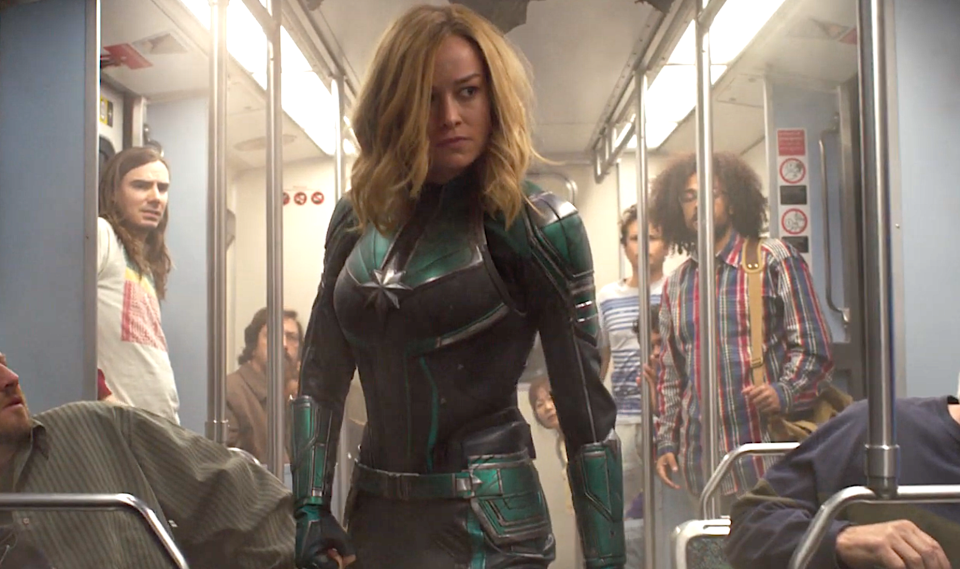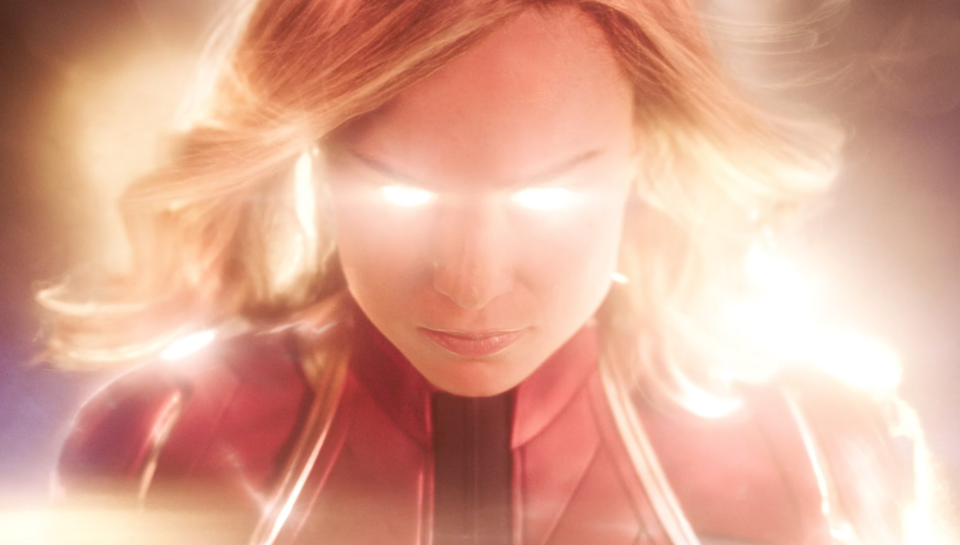‘Captain Marvel’ Review: A Massively Disappointing Introduction to Carol Danvers
For a film that’s almost completely incoherent for most of its first act — and seldom finds its footing after that — “Captain Marvel” is rather clear about its one big idea. Jude Law, playing an alien military commander named Yon-Rogg, mansplains it to his promising female protege as they spar during the opening scene. “There’s nothing more dangerous to a warrior than emotion,” he barks at Vers (Brie Larson). “You have to let go of the part of yourself that makes you vulnerable.” He’s Morpheus, she’s Neo, and this is the dojo fight from “The Matrix” if it were less visceral and more explicitly gendered.
But “Captain Marvel,” despite expectations and appearances, is not a groundbreaking science-fiction saga from the 1990s. On the contrary, it’s the 21st installment of the 21st century’s most popular mega-franchise, and somehow the first to center on a heroine (a fact that makes the film’s arrival a sadly overdue cause for celebration, like a kid blowing out their birthday candles on the 21st try). The context behind Yon-Rogg’s axioms couldn’t be clearer, nor the message more pointed: Women are always being told that they’re too “emotional” to lead, but Vers’ convoluted journey will lead her to see that emotions can be a superpower unto themselves, and that her vulnerability is also her greatest strength. If only Vers’ movie didn’t treat that sentiment like a self-fulfilling prophecy; if only it earned the beautiful idea that it lays out at the start.
Related stories
'Turn Up Charlie' Review: Idris Elba Is a Daddy DJ in Dull Netflix Series
'Captain Marvel' Star Samuel L. Jackson Reflects on Brie Larson's Push for Press Inclusion
'The Walking Dead' Review: 'Guardians' Hits The Brakes on the Season
[youtube https://www.youtube.com/watch?v=0LHxvxdRnYc]
As generic and retrograde as “Black Panther” was specific and revolutionary, “Captain Marvel” is a frustrating disappointment at a time when every inclusive blockbuster is fought over as though it could be the decisive battle in our never-ending culture wars. That disappointment is only deepened by the fact that the film was directed by the talented indie twosome of Anna Boden and Ryan Fleck, whose previous work (“Sugar,” “Half-Nelson,” and “Mississippi Grind” being the highlights) is charged with all the verve and humanity that’s missing here. If not for some grounded character work towards the end of the story, their contributions to this $152-million behemoth would seem totally anonymous.
Read More:‘Captain Marvel’ Star Samuel L. Jackson Reflects on Brie Larson’s Push for Press Inclusion
As much as this movie can be seen as a step in the right direction, it’s so eager to get to the promised land that it trips over itself right out of the starting gate. The first and most fatal mistake of the script that Boden and Fleck co-wrote with Geneva Robertson-Dworet is that it reduces Vers — or Carol Danvers, as she’s later and better known — to an amnesiac for most of her adventure; in other words, Captain Marvel is far and away the least compelling thing about “Captain Marvel.” Her journey begins on the futuristic planet of Hala, where Carol lives alongside a humanoid species called the Kree, and fights as a member of their elite military Starforce. Their mission: To eliminate a race of shapeshifting aliens known as the Skrulls, who can imitate any lifeform they see. So far, so “Star Trek.”
Carol’s contributions to this task are obvious (she can shoot laser fire out of her hands), but her control over them is not; a Kree technology called the Supreme Intelligence (naturally embodied by Annette Bening) had some kind of hand in bestowing these gifts, and it monitors the warrior’s pyromancy via a patch in her neck. Once upon a time, this movie would axiomatically have started at some point before its protagonist assumed her powers, but “Captain Marvel” tries to circumvent the tedium of superhero origin stories by forcing Carol to forget how she even got to Hala, and stretching the truth into the narrative’s central mystery. The result is an origin story that desperately tries to disguise the fact that it’s an origin story, and unlike the Skrulls, the illusion is never the least bit convincing.
“Captain Marvel”
This isn’t the first time a Marvel protagonist has spent an entire movie trying to figure out the basic details of who they are, but at least Star Lord was given some additive character business to fill in the gaps. Ms. Danvers has no such luck, and Larson — an Oscar-winner whose natural protectiveness is poorly served by such a self-satisfied character — has little to do beyond mug for the camera and spout third-rate one-liners to any of the men who get in her way. Larson is far too eager to play her own action figure, and that proud approach doesn’t leave Carol anywhere to go once her memories inevitably return. So she settles for quips and second-hand glimpses into whatever life she used to live. There’s an emotional core in there somewhere, but the movie doesn’t find it. Not since Edward Norton’s Hulk has the MCU offered such a two-dimensional title hero (compared to Danvers, Mark Ruffalo’s Hulk might as well be a Dostoyevsky character).
Read More:Annette Bening Spoiled ‘Captain Marvel’ for Her Kids So They Could Help Her Make Sense Of It
It’s a good thing that the Skrulls are more than meets the eye, because their leader — Talos — is asked to shoulder most of the film’s emotional burden. Giving the best performance in a movie that relies on its excellent cast to compensate for its empty characters, the ever-reliable Ben Mendelsohn elevates Talos into a genuine menace, first in his reptilian form and then as a Ben Mendelsohn-looking body snatcher once Carol escapes from his clutches and crashlands into Los Angeles circa 1995. Yes, before Marvel fans reach the end of their year-long wait to see how the end of “Infinity War” is meaninglessly undone, they’re going to have to sit through a prequel. Somehow, the abundant fan service that entails is less painful than the winking ’90s nostalgia that comes with it.
Alta Vista. Radio Shack. A scene where Bening dances to Nirvana. A climactic needle-drop that’s too cringe-worthy to spoil here. It’s as lazy and superficial as you might expect from a movie that was teed up by a two-way beeper, even if there’s something about the guilelessness of Larson’s performance that seems more at home in these 20th century environs. It’s there, outside of a Blockbuster, that Carol runs into some familiar faces: Future S.H.I.E.L.D. admins Nick Fury (Samuel L. Jackson, whose face has been convincingly de-aged to look 25 years younger) and Phil Coulson (Clark Gregg, whose face has been horrifyingly de-aged to look like it was face-tuned by the lady who botched that fresco of Jesus).
“Captain Marvel”
And so begins a cross-country race for Carol to make sense of her memories before Talos can use them to figure out where the MacGuffin is hiding. Comic book readers won’t be surprised to learn that the road leads to Maria Rambeau (a magnificently well-shaded Lashana Lynch) and some business about the Air Force. Also, Fury falls in love with an adorable cat named Goose, who’s not only the film’s umpteenth “Top Gun” reference, but also a more fun and less tiresome riff on the Groot archetype that “Guardians of the Galaxy” has already driven into the ground.
Friends become enemies, enemies become friends, and just about everyone engages in some of the most tedious fight scenes ever slapped together by a second-unit (Boden and Fleck nod to “True Lies” and “Speed,” but make no apparent effort to recapture the fire-and-brimstone magic of the practical action sequences that made those films into modern classics). Nothing here is as plastic as the subway fight at the end of “Black Panther,” but that’s only because Boden and Fleck lack that degree of ambition. Other tech elements draw a similarly dire contrast, with Pinar Toprak’s forgettable music underscoring just how much Ludwig Göransson brought to Ryan Coogler’s culture-shaking juggernaut.
The film’s busy third act would be a mess if not for its deep bench of supporting characters, who connect to each other in a number of warm and wonderful ways that make Carol seem more effective as a conduit than she is as a Captain. But, for better or worse, this is her story, and she is eventually put in a position to reclaim her agency and disprove the shaky truisms of her alien sensei: Despite never being vulnerable, Carol learns that her vulnerability is not a weakness. Despite never being weak, Carol learns that she doesn’t need permission to be strong. Despite never being unique, Carol learns that she’s just another Avenger.
Beyond the inferences of its opening scene, and a handful of cheeky moments sprinkled throughout (one of the villains basically stands over Carol and demands that she debate him), “Captain Marvel” doesn’t foreground its gender politics. Unlike “Wonder Woman,” the film offers few plot-specific reasons to call attention to who she is under the spandex. That’s a blessing and a curse in a familiar story that leaves you desperate to see Carol offer the movie, its genre, and her impressionable young fanbase something more than a cosmetic overhaul. It could have been “Alien3” or “Princess Mononoke” or “Tank Girl” — hell, it could have been “Batman Returns.” But only in its most regressive ways does it really feel like a blockbuster from the mid-’90s. Neither a blast from the past, nor an inspiring glimpse into the future, at the end of the day it’s just another Marvel movie. And not a particularly good one, at that.
Grade: C-
Disney will open “Captain Marvel” in theaters on March 8.
Sign up for Indiewire's Newsletter. For the latest news, follow us on Facebook, Twitter, and Instagram.



